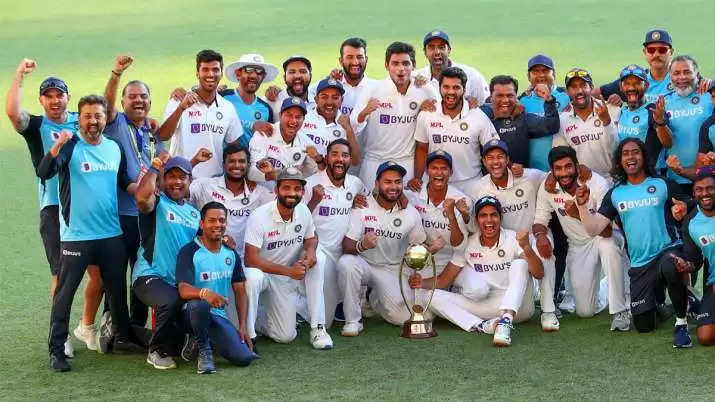Move aside Tolkien, India pens better fantasy at The Gabba

“Frodo: I wish the Ring had never come to me. I wish none of this had happened.
Gandalf: So do all who live to see such times, but that is not for them to decide. All we have to decide is what to do with the time that is given to us.”
After the year that has been, if there’s one thing I want to know, I’d like to know what Ravi Shastri and his men told the boys after that afternoon of horror. The one in Adelaide, perhaps the darkest day that Indian cricket has ever seen. An entire nation was in disbelief and outrage. Not a single batsman’s score in double digits. How could something like this have happened?
During the Second World War, when England was surrounded by the Axis forces on all sides and most of their allies had fallen, only the English channel separated the nation and complete annihilation at the hands of Hitler’s Nazi Germany. An invasion was imminent and in these dark times, as the entire island country was gripped with fear, it was Winston Churchill’s voice that offered some semblance of courage.

Maybe Shastri’s words did not have the same grandiose as Churchill, maybe he didn’t need to. The proletariat of England may not have known much about War, but Shastri’s boys spoke the same language of cricket. They understood him in the same manner as Spartan soldiers offering themselves to the cause of the State at the battle of Thermopylae against a tenfold Persian army who had outflanked them.
And so they followed their leader, King Leonidas I into the last stand. Ahead of the Boxing Day Test, Ajinkya Rahane had to play the role of Leonidas. The word ‘Ajinkya’ in Sanskrit means invincible, impossible to defeat. And in Melbourne, Ajinkya set out to do the same.
After the monumental victory in MCG, I had written that the ghosts of Adelaide had been exorcised and Rahane’s men must go for the hunt. On to Sydney then. Steve Smith, the only man Australia talked about since the Test series began had finally arrived at the party.
The exhaustion of bio-bubbles and long periods of uncertainty had started taking a toll on the team. Players who had been away from the rest of the world since September started showing signs. Exhaustion, mental fatigue, desperation, and with it, injuries, and lots of injuries. The Australia bowling unit, known to be the big, bad bullies of world cricket and the mean pitches didn’t offer much solace either.
Cheteshwar Pujara, Ravichandran Ashwin, Hanuma Vihari, Ravindra Jadeja and Jasprit Bumrah weren’t at their 100%. And yet all of them conspired in one of the biggest heists in cricket’s recent history. At a number of points, Australia thought they had the game but with every blow, India kept ducking out of the way.
Before putting on his pads and gloves, Ashwin could only manage to stand in the dressing room. He had a bad back and hadn’t managed to sleep the night before. Hanuma Vihari had done his hamstring during his innings, the worst of all plagues to sportspersons and a bruised Ravindra Jadeja let Navdeep Saini peel a banana for him.
However, at the end of it all, the scoreline still read Australia 1-1 India. A draw in Sydney that felt no less than a gigantic win. India hadn’t just beaten the crushing jaws of defeat, they had also beaten racial abuse, and the usual heckling and bureaucratic dilemmas that continue to take place between cricket boards.
For the proverbial Battle of Helm’s Deep, The Gabba was to be the venue. The Australians take a lot of pride in Gabba. For 32 years, no one had breached their fortress. Even the mightiest had fallen here. South Africa, England, New Zealand, India before, every team had visited here hoping to pull off an upset only to end up biting the dust.
So it made some sense why Australia were always so adamant about keeping Brisbane as a venue for visiting countries, about why Tim Paine couldn’t help but refer to the Gabba in his weak attempt to sledge Ashwin. At The Gabba, Australia felt superior and truly at home. And the statistics and data metrics backed it up.
To add to India’s woes, and by the time we arrived at Brisbane, it was a pretty long list, they had to miss out on four more players who had played a pivotal part in Sydney. The bedrock of the second innings blockathon Hanuma Vihari, leader of the pace unit Jasprit Bumrah, the man for all situations Ravindra Jadeja and Paine-killer Ravi Ashwin had all been ruled out. So in came T Natarajan, of the T20I series fame and Washington Sundar, making their Test debuts. They were joined by Shardul Thakur, in only his second Test appearance.
The Indian XI that took on Australia for the series decider at their fortress had played a combined 215 Tests between them. For comparison, Australia’s players had 505 Tests. Every rationale and logic that there was suggested that in no way an upset was possible, let alone, one on the cards.
And yet if you watched Pujara get bruised, beaten, buried, heckled, harried to death by Cummins and Hazlewood who all seemed like they wanted his skull for breakfast for a crime as innocent as just standing on the crease, you’d understand why there’s still romance in the struggle. And more importantly, why it trumps achievement every single time. Cheteshwar Pujara sustained 14 body blows across the series, the most by any batsman since such a metric began to be measured. And yet, he stood there absorbing every punch like Jake LaMotta with a single intent of putting willow between the ball and the stumps and driving the innings forward, at any cost.
In the end, all of his hard work, his tantalising 50 was left undone by the vicious swing of a new ball flung by Patrick Cummins and something as trivial as an umpire’s call decision. That one hurt the most.
Earlier, Shubman Gill’s drives had given India some much-needed momentum after losing their superstar opener early with Rahul Dravid’s touch visible all over his polished batting. Gill measured every shot and punished every loose ball with cruel intent.
Even before all of this, Mohammed Siraj, who had lost his father ago nearly a month before but had promised him about making the nation proud was being applauded throughout India for his first career fifer, with his victims including prestigious names in Steve Smith and Marnus Labuschagne. I’m running out of space and there’s Washington Sundar’s heroics and Shardul Thakur’s defiance from the first innings still left.
For Rishabh Pant, often left embarrassed for not being good enough to fill those big shoes vacated by MS Dhoni, the stage was set. Test cricket had become an ODI match and soon, a T20 contest. You wouldn’t expect a guy singing a ‘Spiderman Spiderman’ jingle while keeping to have the same composure and grace as Dhoni.
Wrong. Pant’s batting in the second innings preached control and restraint, something which a 23-year-old has constantly been criticised for. And yet, he ended up reminded an entire nation, including me why it was time to shut up and let the kid play.
It was Washington Sundar’s inexplicable pull shot that crossed the ropes against the number one Test bowler in the world that began the onslaught. Pant joined the party, making sure his shots were risk-averse and finally when it was time, he took a deep breath in and swung his bat, much like Dhoni did almost ten years ago in Wankhede.
Conflict plays an important plot device in every good literature piece. What makes for a good story is how conflict is managed and how characters develop under pressure, over the course of time to resolve said conflict. That is the intent and purpose of good fantasy.
The events from last month that unfolded in Australia could even give JRR Tolkien a run for his money. Heroes in Mohammed Siraj, Shubman Gill, T Natarajan, Washington Sundar and Shardul Thakur emerged out of the shadows, facing the biggest challenges of their life. The usual suspects were met with unwavering circumstances and yet, the rationale was defeated every single time.
Maybe that’s the beauty of sports. That no matter how horrific the past might be, there’s always redemption on the horizon. No matter how improbable a challenge might be, with faith, persistence, patience and belief, even the Everest can be shaken and the Pacific left dry. Sports are human endeavours at its collective finest, the outcomes of many probabilities beating a definite certainty. No work of fiction, no film, biography or story can match that.
A new year is here, vaccines have been approved. The darkest has hopefully blown past and dawn has arrived. With it, Shastri and Rahane’s troops are here to tell you that they just scripted the impossible, tip a hat and go out and do the same. Adelaides have happened before, they may happen in the future again but as long as The Gabbas are conquered, we shall be fine.

